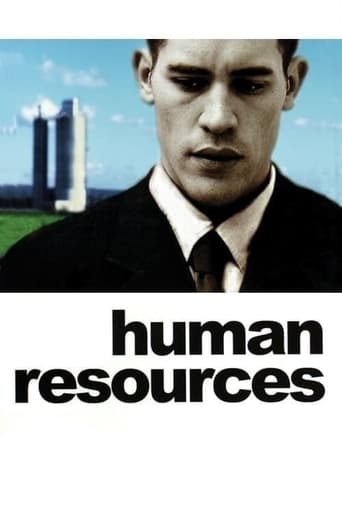

The first thing I have to say is that as a film it seems like a simple movie, without any aspiration. It is not good for planning, photography, or anything special. The only good thing is the actors that at least make it credible. To those interested in the explanation of the title in the spoiler.Spoiler: As a movie for people who do not even dedicate themselves to the movies or have to do it seems to me that it is a movie that can be seen. Although I do not agree with his message, I have to say that as a movie it is worth it.It seems to me a film for the last century because there are all the ingredients, the totalitarian trade unionist, the boss who goes in the back, the employees less subservient to Leninism and then the clerks, who all over the world branded entrepreneurs and are mere currants. The trick comes when the prepared person arrives and it is not based on nonsense if not in today's world, liberal and raises things to see if they work, although this proved the 35 hours failed in France for not being competitive, without bias ideological. I saw his point well until, as it has not led to an ideological point, nothing reasonable and totally sentimental. It is clear that today you have to update whether you or your father.By the way I am amazed at the lack of freedom that the film asks for and only one critic has commented, when you are forced to go on strike, why does not it look like the free choice to work or strike, does anyone oblige to strike? Nobody realizes that at the end of the film, if the second part were done, if the strike had lasted a long time, they would all be unemployed by bankruptcy and if it had not lasted, they would all be unemployed, because of bankruptcy and That the costs today are unbearable.What the driver of errands would say when I passed him, the same thing but it is called evolution and you have to assume it. I hope not to disturb anyone with what I say, but to see if we have already evolved
... View MoreThis film is probably the worst film that I have ever seen. I'm studying french at college and thus understood all the dialog, so the language barrier wasn't an issue. I must say it is really hard to empathize with any of the characters depicted in the movie. There is only one professional actor in the cast and I'm guessing no professional directors or writers.Although I have rated it 1 out of 10 it probably doesn't merit such a poor rating. This is merely a futile effort of lowering its current overall rating of 7.3 to something more realistic. Perhaps 4.3 would be a more accurate rating because the film is a true non-event 100 minutes or so in length that you will never get back.The real shame is that I am sure some college student is busting his nut making a film twice as good and half the length. However if you want to join the bandwagon which seems to be rolling around IMDb you might as well go ahead give "Lost in Translation" a 10 as well.
... View More"Human Resources" tells the story of a young man who interns in the Personnel Dept. of a big French manufacturing plant where his father is a machine operator. The story is all about the tensions which arise between management and labor as the factory prepares to lay workers off and the effects on the relationship between father and son. Given its bland character representations, inconsequential story, limited production value, and annoying white subtitles (with no outline) which are impossible to read when overlaying white subject matter, there is little reason to recommend this film in spite of its favorable critical ratings. Recommended only for French speakers. (C+)
... View MoreI am French and I am very proud when I see that such a movie can be produced in my country - It's not a movie with Gerard Depardieu, it's a movie with real situations and real people, about working in a factory, blue collar and white collar confrontation, family feud. Acting is great with only one professional actor, the rest being amateurs. I highly recommend it. It's not an easy piece. But it will you make think.
... View More